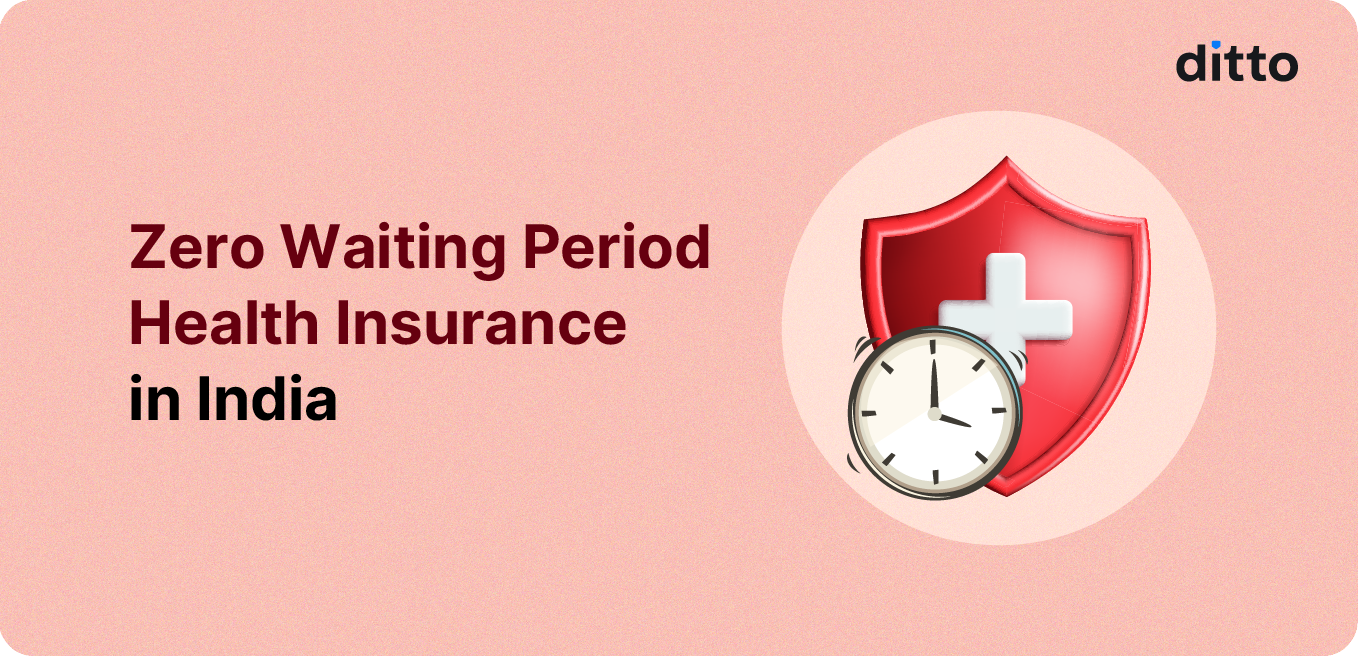Quick Overview
Most health insurance complaints we see at Ditto come from a common pain point: “Why can’t my claim be approved right now?” And in most cases, the answer comes down to waiting periods, a mandatory clause that applies to almost every policy in India.
After reviewing hundreds of policy wordings and real claim cases, one trend is clear: more insurers are now experimenting with zero waiting period benefits to meet growing customer demand for day-one coverage.
In this guide, you’ll understand what a zero waiting period health insurance is, where it applies, and its pros and cons.

What Are the Types of Waiting Periods?
Initial Waiting Period
This is the standard 30-day waiting period that starts from the policy purchase date. During this time, you can’t raise claims for illnesses. However, this doesn’t apply to accidents, which are covered from day 1.
Pre-existing Disease (PED) Waiting Period
Pre-existing diseases (like diabetes or hypertension) are conditions that you’re diagnosed with before buying the policy. These must be declared mandatorily at the time of purchasing a health insurance policy. Initially, the IRDAI decided on a 4-year waiting period for filing claims with PEDs, but this has now been reduced to 3 years.
Specific Illness (SI) Waiting Period
Treatments for slow-growing conditions, such as hernia repair, cataract surgery, or joint replacements, have a 1-2 year waiting period, even if they aren’t pre-existing at the time of purchase.
What is the Zero Waiting Period Health Insurance?
There is no single standard definition. In practice, in India, it usually means one (or more) of the following:
- Day 1 Coverage for Pre-existing Diseases (PEDs)
Some plans cover pre-existing conditions from the first day of the policy's active timeline, or have no waiting period for specific conditions such as hypertension or diabetes.
Example:
- HDFC ERGO Energy Silver: Day 1 coverage for diabetes and hypertension with zero waiting period.
- Aditya Birla Activ One MAX: It reduces the PED waiting period from 3 years to 0 days for Asthma, Hypertension, Cholesterol, Diabetes mellitus, Chronic Obstructive Pulmonary Disease (COPD), Obesity, or Coronary Artery Disease (PTCA done before 1 year.
- Niva Bupa ReAssure Platinum 2.0 Platinum+: It offers day 1 coverage for PEDs like diabetes and hypertension.
- No Initial/Specific-illness Waiting Periods
Some high-end health insurance plans also remove the standard 30-day initial waiting period and waive specific illness waiting periods for certain listed conditions.
Example: ACKO Platinum Health Plan markets itself as a “no waiting period” plan, with initial and specific-illness waiting periods waived (subject to disclosure and underwriting). - Group/Corporate Health Insurance with No Waiting Period
Employer group policies often have zero waiting periods for PEDs and even maternity from day 1, depending on the negotiated terms. - Accidental Hospitalization
Regardless of marketing claims, almost all health insurance policies cover accidents from Day 1, without any waiting period. This is not a zero waiting period feature but standard across policies.
Top Plans with Zero Waiting Period
How Does Zero Waiting Period Health Insurance Work?
Insurers usually implement a zero waiting period health insurance in one of three ways:
- Built into the base plan (e.g. Acko Platinum and HDFC ERGO Energy Silver), where it is explicitly mentioned in the brochure or policy wordings.
- As a paid add-on or rider that reduces waiting periods (e.g. Care Supreme’s Instant Cover or Aditya Birla Active One Max’s Chronic Care.
- Under a group (corporate) policy, where the employer negotiates “no waiting” for PED or maternity and the cost is built into the group premium.
Bottom Line: A zero waiting period health insurance implies immediate or near-immediate coverage for some parts of the policy (often PEDs), not a blanket day 1 coverage for everything. It’s purely a product choice.
Difference Between Survival Period and Waiting Period in Health Insurance
Why Choose Ditto for Your Health Insurance?
At Ditto, we’ve assisted over 8,00,000 customers with choosing the right insurance policy. Here’s why customers like Abhinav love us:

- No-Spam & No Salesmen
- Rated 4.9/5 on Google Reviews by 5,000+ happy customers
- Backed by Zerodha
- 100% Free Consultation
You can book a FREE consultation with us. Slots are filling up quickly, so be sure to book a call now!
Ditto’s Take on Zero Waiting Period Health Insurance
Zero waiting period health insurance plans make sense for people with known medical conditions or those buying insurance for older parents who can’t afford to wait years for coverage.
Conversely, for young and healthy individuals, a standard plan with regular waiting periods is usually sufficient and more cost-effective.
Since insurers are taking on greater upfront risk, these plans generally come with higher premiums and stricter underwriting (more medical checks and more detailed health disclosures).
Before purchasing, always read the policy wording carefully, check for exclusions, sub-limits, and optional riders, and ensure that the plan aligns with your healthcare requirements and budget.
Most importantly, check which waiting periods are waived and for which conditions, instead of assuming every future treatment will be covered from day 1.
If you’re still confused, book a free call with our IRDAI-certified advisors now.
Frequently Asked Questions
Last updated on:










